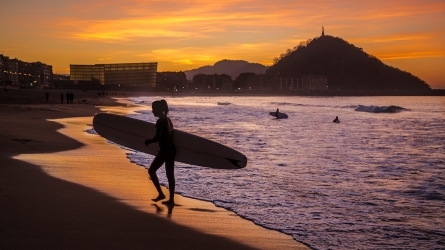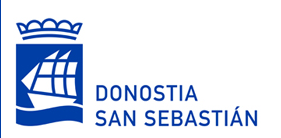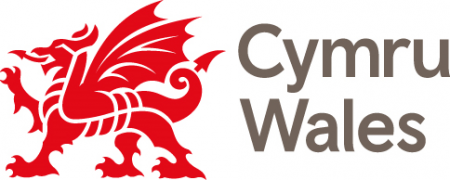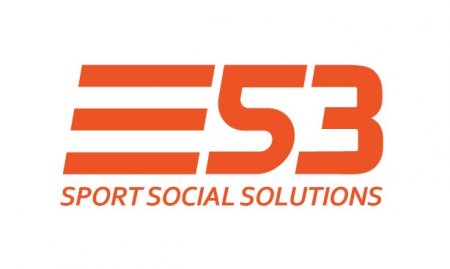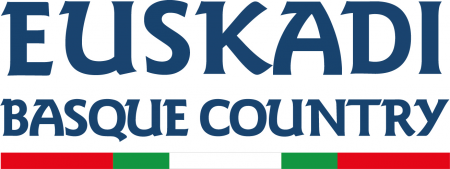Retos y oportunidades de la diplomacia del deporte en el siglo XXI
Una mirada global desde Eukadi.
Descripción
Curso en inglés, euskera y español. Se habilitará servicio de traducción para seguir el Curso en cualquiera de los idiomas.
Durante el año 2023 Euskadi, y Donostia en particular, va a acoger eventos y acontecimientos deportivos que justifican la reflexión sobre un campo con una capacidad de crecimiento enorme. La acogida de las primeras etapas del Tour de France, la consolidación de la Donostia Cup o la celebración de la semifinal del Top 14 son algunos de los hitos que situarán a Euskadi en el mapa mundial. Pero más allá de estos acontecimientos, Euskadi representa por si sola una realidad dentro de la diplomacia del deporte. Una realidad que todavía no ha sido debidamente analizada.
Desde hace tiempo, Euskadi ejerce en la práctica la diplomacia del deporte. No en vano, la diplomacia del deporte es una de las herramientas más poderosas con la que cuentan las realidades subestatatales, naciones sin estado o similares que aspiran a ganar relevancia y posicionamiento internacional. No obstante, existe poca conciencia al respecto. Por tanto, esta propuesta es una oportunidad para unir dos realidades que en ocasiones se ignoran. Es decir, el mundo académico preocupado por la temática y aquellos que desde la práctica ejercen la diplomacia del deporte sin ser totalmente conscientes.
Por otro lado, vivimos tiempos convulsos. La incertidumbre es la característica principal de los nuevos tiempos, en los que emergen nuevos actores en el escenario geopolítico, extendiendo a otros ejes los equilibrios de antaño. En este contexto, el deporte está llamado a jugar un papel estelar en el nuevo escenario geopolítico. Es por ello relevante abrir el debate al público general y profundizar en un ámbito que está adquiriendo un protagonismo creciente en el universo de las relaciones internacionales.
Estructura del curso
La ruta que se propone de cara al curso es la siguiente: En primer lugar, y durante las primeras sesiones, se realizará una aproximación teórica sobre los conceptos de la diplomacia del deporte. Entendemos que queda por hacer una labor pedagógica que acerque y vincule a la sociedad, en general, pero también a las diversas instituciones, agentes e individuos que trabajan en el día a día en este ámbito de formas, muchas veces, inconscientes e inconexas. Se hace necesario, por tanto, explicar sus fundamentos, su historia, las diferentes sensibilidades y aproximaciones que coexisten en él.
En segundo lugar, partiendo de lo general, se plantea ir desgranando aspectos más parciales que coadyuvan en la configuración de la fotografía general. Para ello, abriremos el espacio a aproximaciones y realidades que son insoslayables, pero que necesitan una mención especial por ser, a menudo, desplazadas a un segundo plano. Hablamos de la presencia y la participación de la mujer en el mundo del deporte; los elementos sociales de integración y de cohesión que han posibilitado procesos de reconciliación en Sudáfrica, Irlanda o Colombia; el elemento de negocio y económico que está detrás de múltiples iniciativas de carácter deportivo; la identidad nacional, regional y cultural que subyace en los fenómenos deportivos; etc.
En tercer lugar, el congreso mostrará modelos exitosos y consolidados de políticas de diplomacia del deporte. La labor que ha realizado y realiza la Secretaria de Estado del Gobierno de Estados Unidos será uno de los casos de análisis. Junto a este caso concreto se expondrán modelos de incuestionable éxito. Tomando en consideración la tipología del caso vasco, el congreso permitirá conocer realidades que por dimensión territorial, características identitarias, culturales, políticas o administrativas se acercan a la casuística vasca. Escocia, Gales, Macedonia o Nueva Zelanda serán objeto de análisis. La peculiar política que han seguido los equipos de futbol en Euskadi o el fervor del ciclismo, cercano a la religión, que existe aquí son otros de los elementos que se abordarán en el congreso
El congreso permitirá, además, superar ciertas visiones dominantes en el deporte. La diplomacia del baloncesto, rugby o el surf son algunos de los exponentes de miradas que transcienden a la predominancia del fútbol, por citar el paradigma clásico. Es por ello por lo que fenómenos como el montañismo (junto a otros deportes estrechamente relacionados con la naturaleza) serán objeto de análisis en el congreso. En el montañismo, por ejemplo, amen de su aspecto deportivo, concurren elementos de socialización y de identidad que requieren un análisis que no ha sido abordado hasta el momento.
Por último, el congreso dará cabida a una realidad que no es exclusiva de Euskadi. Los deportes autóctonos configuran una realidad muy relevante. Sin embargo, en ocasiones no se le ha prestado la suficiente atención. A este respecto, el jai-alai ha sido probablemente una de las herramientas o características principales de marca con el que ha contado Euskadi. No obstante, no ha sido hasta que se ha consumado su desaparición en Estados Unidos cuando nos hemos dado cuenta de su valor como marca y como elemento que permitía a Euskadi posicionarse internacionalmente. El aspecto lúdico-deportivo de las estropadak es otro elemento que debe ser objeto de análisis. Asimismo, el congreso analizará otros muchos aspectos que se irán incorporando a medida que se configure el programa.
Todo ello, garantizando una mirada global que supere la visión eurocéntrica y occidental que con mucha frecuencia exponen este tipo de iniciativas. África, Asia, Oceanía y Latinoamérica tendrán un espacio relevante durante el congreso.
Objetivos
Objetivo principal del curso
Socializar el ámbito de la diplomacia del deporte, la cual está llamada a jugar un papel relevante en el nuevo escenario geopolítico.
Objetivos específicos
- ¿Qué es la diplomacia deporte? Realizar una aproximación general al concepto.
- Definición del concepto de la diplomacia del deporte. Analizar el papel de la diplomacia del deporte en la diplomacia pública.
- Exponer modelos referenciales. El caso paradigmático de Estados Unidos.
- Mostrar y analizar modelos equiparables con el vasco. El caso de Nueva Zelanda, Macedonia del Norte, Frisia (Países Bajos), Irlanda, Gales, Quebec y/o Catalunya.
- Destacar la labor que las ciudades pueden realizar a través de la ‘diplomacia de las ciudades’ en el campo de la diplomacia del deporte.
- Mostrar las aportaciones sociales de la diplomacia del deporte.
- Aproximarnos a la dimensión de negocio del concepto.
- Mostrar las dimensiones identitarias y de valores que subyacen bajo el concepto de la diplomacia del deporte.
- Exponer el valor del deporte como instrumento de marca de país.
Público objetivo al que está dirigida la actividad
- Público en general
- Alumnado universitario
- Estudiantes no universitarios
- Profesorado
- Profesionales
Organiza
Programa
28-06-2023
Registration
Inauguración institucional. Orden de intervención:
- Imanol Galdos Irazabal | Donostia Kultura
- Eneko Goia Laso | Donostia/ San Sebastian - Mayor
- Marian Elorza Zubiria | Basque Government - General Secretariat of External Action
- Bingen Zupiria Gorostidi | Basque Government - Culture and Linguistic Policy
- Markel Olano Arrese | Gipuzkoa Provincial Council
“ 1. 1 Session: Fundamentals of Sport Diplomacy“
Speaker: Stuart Murray
- Stuart Murray | University, Australia - Sports Diplomacy Alliance & Bond
Sport Diplomacy as an instrument of public diplomacy
- Carmen Pérez González | Universidad Carlos III - Vice Dean for Academic Exchanges and International Relations; First Vice Dean (Participa via zoom)
“1.2 Session: A comparative look at models“
a) United States
- Ashleigh Huffman | Department of Sports Diplomacy of the United States Government - General director
b) North Macedonia
- Silvija Mitevska | North Macedonia NOC & Founder and Director at Sport Social Solutions - Founder and Managing Director at Sport Social Solutions
c) EU Sports Diplomacy
- Richard Parrish | Edge Hill University - Professor
Pausa
“1.3 Session: Major sporting events: World Cup, Olympics, Tour de France. Diverse viewpoints“
- Jonathan Grix | Manchester Metropolitan University. - Professor
- Ekain Rojo Labaien | University of the Basque Country UPV/EHU - Professor
“ 1.1 Session: Round table: The role of sub-state entities (regions, cities...) and other non state actors in sport diplomacy“
- Carlos Pulleiro Méndez | Basque Country
- Xavier Ginesta Portet | Vic-Central University of Catalonia - Professor
- Ainhoa Churruca Airbe | Zegama Aitzgorri - Directora
- Iñigo Olaizola | Donosti Cup
“1.2 Sessión: A look at the Basque reality: the construction of an identity. A look at the Basque reality; the practice of mountaineering; estropadak; autochthonous sports. Jai Alai. Basque pelota. Cycling. Other models: Scotland.“
- Marian Vaczi | University of Reno - Professor (Participa via zoom)
- Olatz González Abrisketa | UPV/EHU
- Imanol Muñoz | Marketing Director
- Enrique Cifuentes | Behobia San Sebastián - Director
29-06-2023
“Women's voices: the role of women as the key to a renewed perspective on sport“
Sports diplomacy and inclusion
- Claire Jenkin | University of Hertfordshire - Senior Lecturer in Sports Development,
Sport, Human Rights and Safeguarding: Interactions and Gaps
- Dikaia Chatziefstathiou | Canterbury Christ Church University - Reader in Olympic Studies & the Social Analysis of Sport and Director of Research Environment in the School of Psychology and Life Sciences
“The economic-social dimension of sport“
Diplomacy in sport’s geopolitical economy
- Simon Chadwick | SKEMA Business School, Paris - Professor (Participa via zoom)
Pausa
“1.3 Sessión: Other sports. Beyond the prevalence of soccer“
- Lindsay Sarah Krasnoff | Director, FranceAndUS (Director); Adjunct Faculty, New York University Tisch Institute for Global Sport - Director
- Yoav Dubinsky | University of Oregon - Instructor of Sports Business. Cycling diplomacy.
- Neftalie Williams | USC - Skateboarding diplomacy
- Carole Gomez | University of Lausanne (ISSUL) - Graduate assistant, Institute of Sports Sciences (Participa via zoom)
“1. Part one Sport diplomacy and its role in international relations. The emerging scenario of the 21st century“
- Simon Rofe | University of Leeds - Associate Professor
“Part two-Session on the merging of sport diplomacy and broader cultural relations and cultural diplomacy (arts, music, photography, history, landcapes, heritage etc). The case of Welsh“
1. General Presentation
- Gavin Price | SDA and Bond University - Director - UK / Europe (Participa via zoom)
- David Warren | Welsh Government - Head of International Relations
Creative Arts. Cultural activities and sports diplomacy
- Eluned Haf | Arts Council of Wales - Head of Wales Arts international
Professor of Public Policy and the Governance of Wales at Cardiff University's Wales Governance Centre
- Laura McAllister | Cardiff University's Wales Governance Centre - Professor of Public Policy and the Governance of Wales at
“Diolch-Eskerrik Asko from Team Wales David Warren and/or TBC, Welsh Government “
- David Warren | Welsh Government - Head of International Relations
“ Commentary and live music set from Ani Glas “
- Ani Glas | Singer
Fireside chat and audience questions: Ani Glas with Professor Laura McAllister
DJ music (Ani Glas) and drinks to continue for those who wish to stay on for longer in the evening
Directoras/es
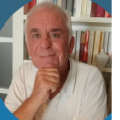
Imanol Galdos Irazabal
Donostia Kultura
Atesora más de 30 años de experiencia en la administración pública, ocupando diversas responsabilidades directivas. Larga trayectoria en los campos de la educación, la universidad, medios de comunicación, cultura y política. Actualmente, trabaja en la Dirección de Donostia Kultura, y fundamentalmente se responsabiliza de los asuntos internacionales. Investigador, ponente internacional y escritor sobre temas relacionados con la diplomacia pública, diplomacia cultural, diplomacia de las ciudades, gobernanza local, política cultural, política exterior, relaciones internacionales y comunicación pública. Ha sido profesor asistente en la Universidad de Reno (Nevada, Estados Unidos). Investigador y visitante en la Universidad de Boise (Idaho, Estados Unidos). Coordinador del programa Other Words/Beste Hitzak (2015-2018). Tiene una diversa y amplia formación académica en Derecho, Lingüística, Traducción e Interpretación, Relaciones Internacionales y Gobernanza y Políticas Públicas.

Gavin Price
Adjunto director
Gavin Price’s career spans 15+ years of experience in international trade, intercultural relations and leadership across the Australian, UK and international public sectors. He is a PhD candidate at Bond University (Australia), an expert on sports diplomacy in small nations and football diplomacy, an Honorary Member of the Centre for Sports Law, Policy and Diplomacy at the University of Rijeka (Croatia) and co-author of the British Council’s research report: Towards a Welsh sports diplomacy strategy. Mr Price pioneered the innovative field of sports paradiplomacy, including successful projects involving government, business, the sportscape and academe in Wales, the Basque Country and with other peak non-state sporting actors. An established writer and speaker, he has delivered publications, podcasts and lectures on topics as wide ranging as Australian and Asian Football Diplomacy, Athlete Activism and sports diplomacy policy and practice in major nations. He is co-director of the 2023 Australia-UK sports diplomacy dialogue series and the world’s first World Congress on sports diplomacy (Donostia-San Sebastián, summer 2023).
Ponentes

Simon Chadwick
Professor Simon Chadwick is a researcher, writer, academic, consultant, policy advisor, and speaker with more than twenty-five years experience in the global sport industry. His work focuses on the geopolitical economy of sport. Chadwick is Professor of Sport and Geopolitical Economy at Skema Business School in Paris, where he is also a member of its think tank - Publika - as well as Programme Director of Skema's Global Executive MBA in Sport. Simon previously co-founded and directed Emlyon Business School's Centre for the Eurasian Sport Industry, the University of London's Birkbeck Sports Business Centre, Coventry University's Centre for the International Business of Sport, and Salford University's Centre for Sport Business. In addition, he has worked at several of the world's most prestigious business schools, such as IESE in Spain, Otto Beisheim in Germany, Tsinghua in China, COPPEAD in Brazil, and Waseda in Japan. He has written numerous articles, books, and research reports for the likes of Forbes, Sloan Management Review, the Wall Street Journal, The Economist, Forbes, Thunderbird International Business Review, Mastercard, Newsweek, Reuters, Time, Routledge, and Financial Times Prentice Hall.

Dikaia Chatziefstathiou
Reader in Olympic Studies & the Social Analysis of Sport and Director of Research Environment in the School of Psychology and Life Sciences in Canterbury Christ Church University, UK. She is the author of the book Discourses of Olympism: From the Sorbonne 1894 to London 2012 published by Palgrave (2012; co-authored with Professor Ian Henry) and the Editor-in-Chief of the Routledge Handbook of the Olympic and Paralympic Games (2020). She has edited several books in relation to Olympic Studies, e.g., on Olympism, Olympic values and Olympic Education. She has also written the storytelling book Imagine my Stories for Peace containing five stories for inspiring young people to embody the Olympic values in their lives (2016; published by the International Olympic Truce Centre). In her more recent work, she is unpacking some of the diverse issues of abuse in sport. She is the Head of the Sport, Human Rights and Safeguarding Research Group that is committed to conducting high quality, values-led research to improve health, wellbeing, and welfare for those working and participating in sport. She is the winner of the inaugural Coubertin Prize 2008 awarded by the International Olympic Committee (IOC) and the International Pierre de Coubertin

Ainhoa Churruca Airbe
I am Ainhoa Churruca Airbe, a 43-year-old Zegamarra who is born, raised and lives there. Industrial delineator by study and profession. Siemens Gamesa, who has been working at the Asteasu company for 21 years. For eight years now, Zegama Aizkorri, director of the mountain race, volunteered. My village and surrounding mountain lover.
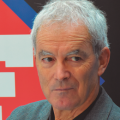
Enrique Cifuentes
Donostiarra desde los cuatro años. Licenciado en Derecho por la Universidad del País Vasco, ejerció como abogado durante toda su vida profesional. Actualmente jubilado. Deportista y practicante sobre todo del montañismo en Pirineos, Alpes, Andes e Himalaya. Presidente del Club Deportivo Fortuna desde 1981 y desde ese año máximo responsable de la carrera popular Behobia-San Sebastián, la más importante del calendario vasco de pruebas deportivas, con 30.000 participantes. Muy implicado en ella y por cuya recuperación histórica apostó también como directivo del club en el año 1979. Impulsor decidido del carácter abierto y popular y de la participación femenina en la prueba.
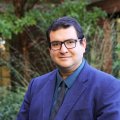
Yoav Dubinsky
Dr. Yoav Dubinsky joined the Lundquist College of Business at the University of Oregon in 2018 after completing his PhD at the University of Tennessee, Knoxville. Born and raised in Tel-Aviv, Israel, Dubinsky is a sports researcher and a former sports journalist with almost two decades of experience covering and researching local, national, and international sports. His interdisciplinary scholarship focuses on sports, nation branding, public diplomacy, and country image and especially how countries, cities, and communities try to improve their images and reputations through sports. As a journalist, he has covered hundreds of sports events around the world. Focusing on the Olympic Movement, Dubinsky has covered or researched the Olympic Games from Beijing, London, Rio de Janeiro, and Tokyo. He has been involved with the International Olympic Academy as a lecturer, a coordinator, and a student, using sports as a tool for inclusion in diverse international environments. Part of Dubinsky’s research line focuses on Israel’s use for nation branding and public diplomacy, including through cycling and the Tour de France.

Xavier Ginesta Portet
Xavier Ginesta Portet es profesor titular de la Facultad de Empresa y Comunicación de la Universitat de Vic-Universitat Central de Catalunya. Miembro del grupo de investigación TRACTE y autor de diversas investigaciones en sport place branding y diplomacia deportiva. Ha ejercido de periodista deportivo para diversos medios de comunicación. Ha trabajado como redactor deportivo en varios medios de comunicación. Es autor de La disneyització del futbol (2021) y Las multinacionales del entretenimiento. Fútbol, diplomacia, identidad y tecnología (2022).

Ani Glas
Ani Saunders is an artist and an electronic pop musician and producer from Cardiff who performs under the name Ani Glass. Ani was raised in both Cornish and Welsh and is a member of Gorsedh Kernow which celebrates the cultural and linguistic heritage of Cornwall. She recently completed a doctorate at Cardiff University that explored the dynamics of agency in old industrial towns in Wales. It focussed on two case studies in Wrexham and Llanelli - the former which considered the power and influence of culture (be it art, music, football or any other form of expression) in driving change, and the latter that looked at the growing influence of health and well-being in driving change. She is looking to continue this journey by working with individuals and organisations that are seeking to empower communities to build their own agency and drive their own visions for change, specifically in the context of arts and football.
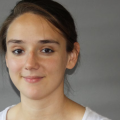
Carole Gomez
Está escribiendo su tesis sobre cómo abordan las federaciones deportivas internacionales la violencia de género dentro de su deporte. También es investigadora asociada en el IRIS, especializada en la geopolítica del deporte, y su trabajo de investigación, principalmente para instituciones francesas y extranjeras, se centra en la diplomacia deportiva, las cuestiones de integridad y la reforma de la gobernanza deportiva.
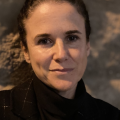
Olatz González Abrisketa
Soy profesora de la Universidad del País Vasco (UPV/EHU) y presidenta de la Asociación vasca de Antropología, Ankulegi. Mis principales temas de investigación han sido el deporte, las solidaridades sexuales y los mundos animales. Respecto al primero de ellos, soy autora de Raquetistas. Gloria, represión y olvido de las pelotaris profesionales (San Soleil, 2022), y Pelota Vasca: un ritual, una estética (Muelle de Uribitarte, 2005), publicado en inglés en 2012 como Basque Pelota: a ritual, an aesthetic (CSB, UNR). También he dirigido, junto al cineasta danés Jørgen Leth, Pelota II (2015) y he realizado la dirección científica de la exposición Jokoak. Materia y desafío, celebrada en el Museo de San Telmo en 2016.

Jonathan Grix
Jonathan Grix is a full Professor of Sports Politics and Policy in the Business and Law Faculty at Manchester Metropolitan University and leads the Faculty’s Sport Policy Unit. He is a global academic leader in the politics of sport and has published over 70 peer-reviewed articles, 30 book chapters and 15 books. His areas of expertise are the politics of sport, government involvement in sport and sports mega-events and soft power. Jonathan’s most recent book is Entering the Global Arena: Emerging States, Soft Power Strategies and Sports Mega-Events (2019) and he is currently working on the role of Germany in the politicization of modern sport. Jonathan is the Editor-in-Chief of the International Journal of Sport Policy and Politics.
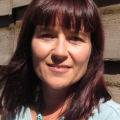
Eluned Haf
Eluned Hâf is Head of Wales Arts International, the international agency of the Arts Council of Wales and works closely with Welsh Government to deliver cultural programmes for Team Cymru initiatives, such as the recent international cultural programme for the FIFA World Cup. A mother-tongue Welsh speaker, Eluned studied languages and journalism and worked for BBC Cymru Wales and Reuters TV before becoming press officer for the Greens/EFA Group in the European Parliament. She was the founder of una creative European communications agency taking up her current role. She lead the successful bid to host the World Music Expo WOMEX in Cardiff in 2013. A career high was in 2015 when language and culture was adopted as one of the seven goals in the pioneering Wellbeing of Future Generations Act, Wales’ contribution towards the UN Global Goals. Eluned loves to sing and play football with her three boys. At the age of 14, she was the first girl to attend the Bobby Charlton Soccer School, an experience that helped to shape her determination to fight for equalities for all in sports.
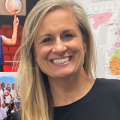
Ashleigh Huffman
Dr. Ashleigh Huffman is the Chief of Sports Diplomacy at the U.S. Department of State based in Washington, DC. Ashleigh works with governments, sports leagues, organizing committees, nonprofits, educational institutions, and businesses to tackle global issues and advance foreign policy priorities such as gender equity, diversity and inclusion, disability rights, climate change, mental health, and racial justice. She serves as a leading advisor on international sport policy and oversees international exchange opportunities, including world championships, the Olympics and Paralympics, and the World Cup. Before joining the State Department, Ashleigh was a professor at the University of Tennessee and co-founder of the Center for Sport, Peace, and Society. In that role, Ashleigh worked closely with the State Department and espnW to launch the Global Sports Mentoring Program, which was awarded in 2018 with the ESPN Stuart Scott Humanitarian Award and the Peace and Sport "Diplomatic Action of the Year” Award. Ashleigh has worked with professional, university, and amateur athletes and coaches from more than eighty countries, including the United States, on leadership development, cultural understanding, and social change. She frequently l

Claire Jenkin
Dr Claire Jenkin is a Senior Lecturer in Sports Development at the University of Hertfordshire in the UK. She has been in the sports development industry for over 15 years working across the UK, Australia and Zambia, ranging from working in local communities, to informing national and international policy and practice through academic research and teaching, for example, being an expert witness for the UK Government’s 2020 inquiry into ‘Sport in our Communities’. Her main research areas are sport for development, sports diplomacy and community sport participation for under-served communities. Claire is also the Co-Chair of the UK Sport Development Network and is passionate about knowledge exchange.
Dr. Lindsay Sarah Krasnoff is a historian, writer, speaker, and consultant working at the intersection of global sport, communication, and diplomacy. Director of #FranceAndUS, she is the author of Basketball Empire: France and the Making of a Global NBA and WNBA (2023), The Making of Les Bleus: Sport in France (2013) and Views From the Embassy (2014), and has written about global sports for The Athletic, CNN International, VICE Sports, ESPN, The Washington Post, The New Yorker, and others. Krasnoff is an Adjunct Lecturer with the Robert Preston Tisch Institute for Global Sport, New York University, where she teaches classes on sports diplomacy. As a Research Associate with the Centre for International Studies and Diplomacy, SOAS University of London, she co-directed the “Basketball Diplomacy in Africa” project pegged to the NBA’s Basketball Africa League. A veteran of the U.S. Department of State’ Office of the Historian, Krasnoff has taught at SOAS University of London, the Foreign Service Institute, The George Washington University, Queens College, Baruch College, and Riverdale Country School. In addition to serving as a SIGA Women Global Mentorship Programme mentor, Krasnoff is an advisory board member for the History Communi

Laura McAllister
Professor of Public Policy and the Governance of Wales at Cardiff University's Wales Governance Centre. Expert on devolution, Welsh politics and elections, public policy and leadership, gender and political representation and sports governance. • Former Wales international player and captain with 24 caps. • Former Chair of Sport Wales and board member of UK Sport. • Current Director of Football Association of Wales Trust. • Deputy Chair of UEFA Women’s Football Committee and member of UEFA women’s strategy working group. Contested election for place on FIFA Council in April 2021. • Chair of the Welsh Sports Hall of Fame. • Co-chair of Independent Commission on Constitutional Future of Wales (with Dr. Rowan Williams), 2021- • Chair of the National Assembly Expert Panel on Electoral Reform, 2017. • Former member of Assembly Remuneration Board, Independent Panel on AMs Pay and Support, the Richard Commission on the Powers and Electoral Arrangements for the National Assembly for Wales. • Western Mail/Wales Online columnist and media commentator on politics, elections, football and sport. • Board trustee of Institute of Welsh Affairs. • Non-executive director of Goodson Thomas Executive Search. • Honorary degrees and fellows

Silvija Mitevska
Silvija Mitevska is the co-founder and president of the non-governmental organization Sport Social Solutions focusing on creating positive change through sport and sustainable development. Silvija was the advisor to the Prime minister of North Macedonia on sports and she has designed and developed numerous national sports policies and programs, particularly in the field of sports diplomacy. She is a certified leader from U.S .State Department Sports Diplomacy Program- Global Sports Mentoring Program and currently she is chairing the Commission on gender equality within the Olympic Committee of North Macedonia as well the Commission on sustainability at International Teqball Federation. Silvija Mitevska was a professional paragliding pilot who has won numerous awards at national and European level. She is also a writer who has published two fiction books.
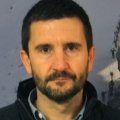
Imanol Muñoz
Imanol was born in San Sebastian in 1971. Native in Basque and Spanish and with English as a language of professional communication. He has a degree in Economics and Business Administration from the University of Deusto, specializing in Marketing and has completed a postgraduate degree in International Trade at the Chamber of Commerce of Gipuzkoa. After 5 years in Strategic Marketing Consulting (Eurogap S.L.), in 1999 he took over the Marketing and Sales Management at LORPEN, driven by his passion for sports and branding, to launch the Etxalar technical socks brand worldwide. In 2015 LORPEN joins TERNUA GROUP, where he joins to take over the Commercial and Marketing Management of the sports brands ASTORE, TERNUA and LORPEN. With the development of the group, his current position is Marketing Director at TERNUA GROUP, with responsibility for the development of the ASTORE, TERNUA, LORPEN, LOREAK MENDIAN and TERNUA WORKWEAR brands

Stuart Murray
Stuart Nazioarteko Harreman eta Diplomaziako irakasle elkartua da (Bond University, Australia), Kirolaren Akademiako Global Fellow bat (Edinburgoko Unibertsitatea), Rijekako Unibertsitateko (Kroazia) Kirol Zuzenbide, Politika eta Diplomaziako Zentroko ohorezko kidea eta Griffith Unibertsitateko (Australia) Adjunct Research Fellow bat. Mundu mailan errespetatua den editore, idazle, hizlari eta Nazioarteko Harremanetan, Diplomazian eta Kirol Diplomazian aditua den batek, parekoen artean berrikusitako dozenaka argitalpen ditu, Kirol Diplomaziari buruzko liburua idatzi zuen: Jatorria, Teoria eta Praktika, eta, aldizka, gobernuei, nazioarteko erakundeei eta estatukoak ez diren eragileei diplomaziarekin, nazioarteko gaiekin eta kirolarekin zerikusia duten hainbat gairi buruzko aholkuak ematen dizkie. Era berean, Kirol Diplomaziaren Aliantzaren sortzaileetako bat da, mundu mailako aholkularitza eta egiaztapen negozio bat, kirolaren ahalmena aprobetxatzen espezializatua, eragin komertzial, diplomatiko eta soziala sortzeko. Bezeroen artean gobernuak, Kanpo Arazoetako Ministerioak, nazioarteko kirol-erregimenak eta munduko kiroleko beste jokalari asko daude.
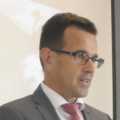
Iñigo Olaizola
Nacido en Donostia, licenciado en geografia e historia. Su trayectoria profesional esta mayormente vinculada al a organizació n de eventos deportivos: es el fundador y director de varios eventos importantes como la Donosti Cup, la carrera de empresas, o la Donosti masters cup. Es también el actual director de la Maratón de Donosti y la Clásica 15k. En el pasado organizó actos como el centenario de la Real Sociedad y los campeonatos de Europa y del Mundo de atletismo de veteranos.
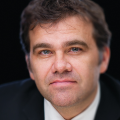
Richard Parrish
Professor Richard Parrish is Professor of Sports Law at Edge Hill University where he is the Director of the Centre for Sports Law Research. Between 2016-19 he was awarded the Jean Monnet Chair of EU Sports Law and Policy by the European Union. Professor Parrish has advised the EU institutions on the development of its EU sports policy, having been a member of the European Commission’s Group of Independent European Sport Experts and a member of the EU Commission’s High-Level Group on Sport Diplomacy. He has authored some of the most influential sports studies commissioned by the EU institutions and he has accepted multiple high-level speaking invitations from public and private bodies from across Europe. He has advised numerous governments and sports bodies on sport related matters.
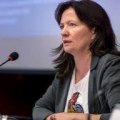
Carmen Pérez González
Carmen Pérez has written extensively in the area of International and EU sports law, anti-doping and the protection of athletes’ fundamental rights. She has over 15 years of experience working with international and multidisciplinary teams. She has been the project leader of Spanish national projects on the role of sport in EU Law and has been a project partner of an Erasmus + funded project focused on football agents (2018-2019). She is now a project partner of two Erasmus+ funded projects focused on EU Sport diplomacy. Between 2005 and 2014 Carmen Pérez served as Member of the Spanish Committee on Sport Discipline (Spanish Sports Council). Since August 2018, she is the President of the Disciplinary Committee of the Royal Spanish Football Association (Real Federación Española de Fúbtol). Between September 2015 and July 2016, she served as Member of the High-Level Group on Sport Diplomacy of the European Commission. She is the Chair Holder of the UNESCO Chair ELIS (Education Linkage through International Sports) in Sport diplomacy and development of a human rights culture through sport established in 2021 at Universidad Carlos III de Madrid

Gavin Price
Adjunto director
Gavin Price’s career spans 15+ years of experience in international trade, intercultural relations and leadership across the Australian, UK and international public sectors. He is a PhD candidate at Bond University (Australia), an expert on sports diplomacy in small nations and football diplomacy, an Honorary Member of the Centre for Sports Law, Policy and Diplomacy at the University of Rijeka (Croatia) and co-author of the British Council’s research report: Towards a Welsh sports diplomacy strategy. Mr Price pioneered the innovative field of sports paradiplomacy, including successful projects involving government, business, the sportscape and academe in Wales, the Basque Country and with other peak non-state sporting actors. An established writer and speaker, he has delivered publications, podcasts and lectures on topics as wide ranging as Australian and Asian Football Diplomacy, Athlete Activism and sports diplomacy policy and practice in major nations. He is co-director of the 2023 Australia-UK sports diplomacy dialogue series and the world’s first World Congress on sports diplomacy (Donostia-San Sebastián, summer 2023).

Carlos Pulleiro Méndez
Carlos Pulleiro Méndez (Bilbao, 1987) obtuvo en 2016 su Doctorado en Estudios Internacionales en la Universidad del País Vasco. Entre 2018 y 2021 fue investigador en la Escuela de Estudios Internacionales de la Universidad Sun Yat-sen (China). En 2019 y 2020 fue visiting professor en el Centro de Estudios de Ocio de la Universidad de Deusto. En 2022 es contratado como profesor del Grado en Ciencias de la Actividad Física y el Deporte de la Universidad Europea de Gasteiz (EUNEIZ). Actualmente es investigador asociado en el International College of Football de la Tongji University en Shanghai, China. Su principal línea de investigación es la diplomacia deportiva, publicando diferentes artículos científicos y siendo evaluador para Routledge y para revistas de alto impacto como Communication and Sport, Estudos Internacionais, International Sports Policy and Politics, Soccer & Society o CIDOB d'Afers Internacionales.
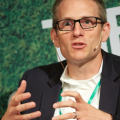
Simon Rofe
Dr J. Simon Rofe is world leading expert in Sports Diplomacy. Simon has an international research profile addressing sports diplomacy, with a particular focus upon the relationship of the sporting ecosystem with diplomatic practice. He has worked with numerous stakeholders from across the sporting and diplomatic realms including, UNESCO & UNICEF, the United Kingdom’s Foreign, Commonwealth and Development Office and Department for Culture, Media and Sport, Foreign Services and government agencies from around the world, anti-doping associations, bidding and organising committees. Simon is Reader and Associate Professor in International Politics at the University of Leeds (2022- ), having been Reader in Diplomatic Studies at SOAS University of London (2011-2022). He developed the first MA module globally to address ‘Sport and Diplomacy: More than a Game’, following a role in the London Organising Committee of the Olympic Games (LOCOG) in 2012. Along with a team of European based colleagues, Simon is working to complete an Erasmus+ project Towards a European Sport Diplomacy strategy. Simon founded the Sport, Diplomacy, and Governance Hub, which provides for multi-directional knowledge exchange, and has established a strong multination

Ekain Rojo Labaien
UPV/EHU
Soy Doctor en la Universidad del País Vasco UPV/EHU (2013) con una tesis doctoral con que analizo el triunvirato formado por el deporte, la comunicación de masas y las identidades nacionales. Profesor de la UPV/EHU desde el año académico 2016-2017, donde imparto docencia en asignaturas vinculadas con el análisis de la comunicación y la cultura. Soy miembro del Grupo de Investigación NOR. Entre mis ejes de estudio propios se resaltan estos tres: Las identidades de estados e identidades nacionales, el evento del deporte y la comunicación de masas. He efectuado tres estancias largas de investigación relacionadas con esos ámbitos. En Aix en Provence (Francia) en 2011 en la Maison Méditerranéenne des Sciences de l'Homme; en Liverpool (Reino Unido) en 2014 en la Liverpool University Management School; y en Bakú (Azerbaiyán) en 2015-2016 en la Qafqaz University. Esta última estaba vinculada al programa postdoctoral Erasmus Backis financiado por la Comisión Europea. Soy autor de publicaciones académicas tanto en revistas y libros internacionales como en euskara. He participado en varios congresos internacionales y nacionales.

Marian Vaczi
Mariann Vaczi is Assistant Professor of Basque Studies and Anthropology at the University of Nevada, Reno. She has worked extensively on the social, cultural and political dimensions of sport in the Basque Country, Catalonia, Transylvania, and Hungary. Her main work is Soccer, Culture and Society in Spain: An Ethnography of Basque Fandom (Routledge 2015), and Sport and Secessionism (co-editor, Routledge 2021).

David Warren
David Warren is the Head of International Relations leading on delivering the Welsh Government’s International Strategy. This includes leading an 18-month focus on sports diplomacy using the opportunities of Wales' participation in sporting competitions to raise our profile and share our values. Prior to that, he has held a number of policy roles including recently as the Head of Circular Economy Policy where he developed the Beyond Recycling strategy. Originally from London, David is a huge football fan and has been in Wales for almost 20 years and is a fluent Welsh speaker.

Neftalie Williams
Dr. Neftalie Williams is a sociologist and USC Provost’s Post-Doctoral Scholar at the Annenberg School of Communication and Journalism and Yale Schwarzman Center Visiting Fellow in Race, Culture & Community. He investigates global issues of race, diversity, identity, and youth empowerment, using the lens of action sports culture. The first ‘Ambassador of Skateboarding’ and envoy for the US Department of State, he introduced the concept of skateboarding as a tool for cultural diplomacy in both theory and practice. Utilizing ‘skate diplomacy,’ he first aided the US Embassy in the Netherlands in 2017 to integrate young Syrian refugees into Holland. Since then, he has utilized skate diplomacy to work with US Embassies and NGOs in Cuba, Brazil, South Africa, and Barbados. Williams co-founded the College Skateboarding Educational Foundation (CSEF), a non-profit dedicated to creating scholarships for young skateboarders to pursue higher education, and serves on the Boards for the Tony Hawk Foundation, Skateistan, McKinnon Center for Global Affairs, and chairs the Diversity, Equity, and Inclusion Committee for USA Skateboarding.
Precios matrícula
| Presencial | Hasta 31-05-2023 | Hasta 28-06-2023 |
|---|---|---|
| 25,00 EUR | 59,00 EUR | |
| - | 84,00 EUR | |
| - | 71,00 EUR | |
| - | 59,00 EUR | |
| - | 71,00 EUR | |
| - | 71,00 EUR | |
| - | 0 EUR |
| Online en directo | Hasta 31-05-2023 | Hasta 28-06-2023 |
|---|---|---|
| 25,00 EUR | 59,00 EUR | |
| - | 0 EUR | |
| - | 84,00 EUR | |
| - | 71,00 EUR | |
| - | 59,00 EUR | |
| - | 71,00 EUR | |
| - | 71,00 EUR |
Lugar
Palacio Miramar
Pº de Miraconcha nº 48. Donostia / San Sebastián
Gipuzkoa
Palacio Miramar
Pº de Miraconcha nº 48. Donostia / San Sebastián
Gipuzkoa
